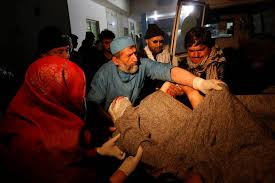KABUL, Jan 10 —Attacks in three major Afghan cities highlighted the worsening security situation in the country, as blasts killed more than 45 people on Tuesday and wounded close to 100 others, including members of a delegation led by the ambassador of the United Arab Emirates.
Kandahar’s provincial governor, Humayun Azizihad, had been meeting with the U.A.E. ambassador to Afghanistan, Jumaa al Kaabi, at the time of the explosion, and both survived with injuries, Afghan officials said.
“Both of them are in stable condition,” said Samim Khpalwak, the governor’s spokesman.
The provincial health department in Kandahar said the explosion killed 11 people, including a number of Emirati diplomats and high-ranking Afghan officials at the meeting. At least 14 others were wounded.
“The corpses are difficult to identify,” a provincial health official said, adding that the building had caught fire, burning victims inside.
There was no immediate claim of responsibility.
The U.A.E. Ministry of Foreign Affairs said its ambassador to Afghanistan and a number of Emirati diplomats had been wounded in the attack. It didn’t say whether any had been killed.
“The U.A.E. ambassador’s visit to Kandahar was on [a] humanitarian mission within the program of the U.A.E. to support the brotherly Afghan people,” the ministry said.
In Kabul, twin blasts killed at least 32 people and wounded at least 70 others near Parliament during afternoon rush hour, at an office building used by members of Parliament, officials said. In the first explosion, a suicide bomber detonated an explosives vest next to a minibus transporting government employees, they said. As rescue crews reached the scene, a car bomb went off.
The Taliban, Afghanistan’s largest insurgency, claimed responsibility for the assault, which interrupted weeks of relative calm in the capital amid frigid winter temperatures.
The explosions shattered the windows of nearby buildings. Casualties were transferred to hospitals by ambulances and private vehicles, said Mohammad Asil, an employee of a private firm who was near the scene.
“It was horrifying,” he said. “I have never seen so many dead bodies in my life. Many innocent people died. It was like a bloodbath.”
The attack is the deadliest in Kabul since Islamic State claimed responsibility for a November bombing that killed 30 Shiite Muslim worshipers at a popular shrine.
The Taliban and the country’s Islamic State affiliate regularly staged attacks in the city throughout the past year, targeting government workers and buildings, foreigners and members of Afghanistan’s Shiite Hazara minority.
The third attack took place earlier Tuesday. The Taliban bombed a meeting of an elite Afghan intelligence agency squad in the capital of Helmand province, killing at least three people and wounding seven others, said Payenda Mohammad, a local police official. The casualties included members of the squad, he said.
Following the bombing in the province’s capital Lashkar Gah, intelligence officers also found a truck in the area that was loaded with explosives, which they defused, Mr. Mohammad said.
The Taliban claimed responsibility for the attack in a text message, saying the assailant fled the area after the assault. Local authorities said it was a suicide attack.
Afghan President Ashraf Ghani’s special representative for security in Helmand, Abdul Jabar Qahraman, said the intelligence agency squad had been formed last year to strike Taliban-controlled areas.
“This is guerrilla war and the creation of such force is a necessity,” Mr. Qahraman said. “We have to go after the Taliban inside their strongholds.”
Helmand province in the southwest of the country is a major center of narcotics production and trade, making it an important source of income for the militants.
Last year, the Taliban nearly overran Lashkar Gah but were pushed back by U.S. and Afghan troops. The city remains under siege, with most major roads leading to and from the city controlled by the militants.
The latest spasms of violence in Afghanistan come a little more than a week before Donald Trump is sworn in as U.S. president.
Amid gains by the Taliban and the growth of Islamic State, U.S. military involvement in Afghanistan has deepened since the withdrawal two years ago of most foreign forces in the country.
In the past year, the Obama White House has granted expanded authority to the U.S. military to fight Islamic State in Afghanistan and to allow the U.S. to target the Taliban under certain circumstances.
The number of airstrikes carried out by the U.S. Air Force in the country increased dramatically last year, and on Friday the Pentagon announced that 300 U.S. Marines would be deployed to Helmand this spring, the first marines in the province since 2014.
The U.S. has about 10,000 troops in Afghanistan to train and advise government security forces fighting the Taliban.
—Jessica Donati in Kabul and Asa Fitch in Dubai contributed to this article.

